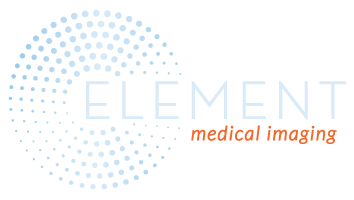We want to be sure all of your questions are answered. Please feel free to contact us if your question is not shown here.
Please call our office to speak with a staff member 913.469.8998
Please bring a copy of your insurance card and a valid ID.
We accept most major insurances. For a comprehensive list of insurances accepted at EMI, please see our page regarding Insurance.
Yes. Element Medical Imaging will file your primary and/or secondary insurance to verify what portion of your visit they will cover. Any residual balance will be billed back to you, the patient.
You will need to obtain the results of your scan from your referring provider. Your provider will have a copy of your report within 72 hours of your visit date.
Each procedure is read and interpreted by a board-certified radiologist. The radiologist dictates a report on the findings of the exam, and a written copy is sent to your referring physician within 24-48 hours after your appointment. If your provider has requested a STAT reading, a preliminary report is sent to them immediately after the images have been reviewed by the radiologist.
Since your provider knows your health history and has ordered the procedure, they are the best person to discuss the findings with you. We delay access of reports on the patient portal to allow your provider time to review the report and determine the best treatment course for patients based on their complete medical history.
A screening mammogram is routinely administered to detect breast cancer in women who have no apparent symptoms. Diagnostic mammograms are used after suspicious results are seen on a screening mammogram or if the patient is experiencing some sign of breast cancer. Some signs include lumps, pain, nipple discharge, thickening of the skin on the breast or changes in the size or shape of the breast. Who can I call if I'm not sure of my preps?
What should I bring with me to my appointment?
Do you take my insurance?
Does Element Medical Imaging file my insurance for me?
How soon can I get the results of my scan?
After my test is completed, who reads my exam?
Why is there a delay before I can access my report?
Whats the difference between a screening mammogram and a diagnostic mammogram?
Screening mammograms are typically fully covered by health insurance. Diagnostic mammograms are also typically covered by health insurance. However, it will likely be subject to deductible and co-insurance standards that your plan requires.

